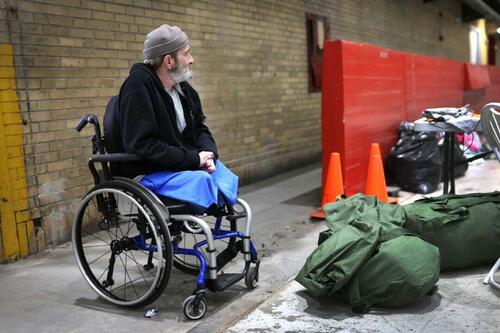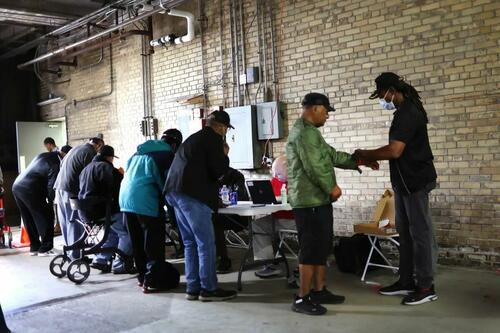Homelessness Rises Among US Veterans For 1st Time In 12 Years As Immigration Crisis Escalates
Authored by Mary Prenon via The Epoch Times (emphasis ours),
As national, state, and local governments continue to spend billions of dollars to house, feed, clothe, and provide medical care for millions of illegal immigrants, homelessness among U.S. veterans has risen dramatically for the first time in 12 years.
A recent report from the Department of Housing and Urban Development (HUD) details a 7.4 percent increase in veteran homelessness between 2022 and 2023 and estimates that more than 35,000 veterans are homeless on any given night. Over the course of a year, according to the report, almost twice as many veterans may experience homelessness. In total, HUD estimates that nearly 13 percent of the homeless adult population are veterans.
Kate Monroe, a U.S. Marine Corps veteran and CEO of VetComm.us, calls this situation “the ultimate betrayal” by the U.S. government. She is also a California Republican congressional candidate.
“What they are trying to do is get as many people into the U.S. as they can,” she told The Epoch Times. “And what we’re saying to our homeless veterans is that we as a country don’t care. It’s no wonder why recruiting is down by 20 percent.”
According to a November 2023 report by the Homeland Security Republican Committee, the money spent on illegal migrants could cost Americans up to $451 billion by the end of this year. According to NYC.gov, the official website for New York City, the Big Apple alone doled out $1.45 billion in 2023 to provide food, shelter, and services to tens of thousands of immigrants. Several published reports indicate that Chicago paid $138 million during the past year to house, feed, and care for illegal immigrants.
The Federation for American Immigration Reform reports that the state of California, which had the highest number of immigrants in 2023—more than 160,000—spent some $22.8 billion for their care in 2023. California has also become the first state to offer health insurance for all illegal immigrants.
“I’ve been down to the border. Buses pull up, and illegal migrants are given food, a cell phone, and a plane ticket,” Ms. Monroe said. “They are taking away housing and resources from veterans, and the American people are the victims.”
Her firm is dedicated to helping veterans receive what they are owed from the Department of Veterans Affairs (VA) and is also working to provide them with shelter and empower them to improve their quality of life.
“We do anything we can to prevent them from ending up on the streets,” Ms. Monroe said. She and her team regularly visit California’s most affected regions, including the “Bottoms” in San Diego and San Francisco’s Tenderloin District, where they consult with homeless veterans.
While funding and services are available through the VA, Ms. Monroe said that too often, people can fall through the cracks.
“They’re just not getting access to it quickly and efficiently, especially since the entirety of the VA homelessness program is based on the VA giving grants to third parties, who then give a fraction of that money to the veterans,” she said.
At the end of January, the VA reported it had permanently housed 46,552 homeless veterans in 2023, exceeding its goal of 38,000.
VA spokesman Terrence Hayes told The Epoch Times that the department is committed to ending veteran homelessness and that no VA funds are ever earmarked for shelter or health care for illegal immigrants.
“The VA does not provide or fund any health care for ICE [U.S. Immigration and Customs Enforcement] detainees,” he said.
“No funding or any other resources from VA are used to pay for or provide housing or health care services to non-Veteran individuals detained in [ICE] custody.”
Mr. Hayes also refutes a section of a report from the Department of Homeland Security claiming the VA has been appropriating resources to provide medical care for illegal migrants.
The phrase in question states that “ICE contracts with the VA Financial Services Center (VAFSC) to process medical claims reimbursements; providers must complete and submit information to receive payment.”
According to Mr. Hayes, a 2002 payment processing agreement allows ICE to pay for the VAFSC to process payments for ICE-funded health care.
“This is fully paid for by ICE and has no impact on veteran care or services whatsoever,” he said. “VAFSC provides an administrative function for ICE, using ICE funds, that has zero impact on veteran health care or benefits.”
A statement issued by the VA at the end of January also states that “ending veteran homelessness is a top priority of the VA and President Biden.” It concludes that “no veteran should ever experience the tragedy and indignity of homelessness.”
The VA has a website to help those veterans in need of finding permanent housing take advantage of VA Homeless Programs. This month, it published a “Notice of Funding Opportunity” for almost $5 million in grants per year to help veterans who are currently homeless or at risk of becoming homeless. The funds are available through the VA’s Homeless Providers Grant and Per Diem Program.
Veteran Homelessness Factors
One of the biggest problems facing homeless veterans is post-traumatic stress disorder (PTSD), which occurs when a person has experienced or witnessed a shocking, terrifying, or dangerous event.
“A lot of combat vets suffer from PTSD, and if they don’t get it treated, it can result in a series of problems,” Ms. Monroe said. “They can have anger issues at work, and sometimes they don’t integrate well with their peers. As a result, they may lose their jobs and eventually end up on the streets.”
In other situations, veterans may experience difficulty transitioning to civilian jobs, she said.
“For example, if their days were spent on aircraft carriers or operating tanks, those jobs don’t exist in the civilian world,” Ms. Monroe said. “They’re also used to surviving with room and board and may not be experienced in how to properly budget for housing, food, clothing, and other necessities.”
One solution that she has proposed is setting up temporary base camps to serve veterans experiencing homelessness. With her own field experience in setting up these camps, she contends that many cities already have the capabilities to establish this type of transitional housing. Within this setting, Ms. Monroe said, vets could also take advantage of counseling services, security, sustenance, sanitation, and disability support. She maintains that this model would be just a fraction of the cost that cities regularly spend to place the homeless in hotels.
Services for Homeless Veterans
Based in Washington, the National Coalition for Homeless Veterans (NCHV) is focused on ending veteran homelessness by promoting collaboration and managing a referral helpline for those either at-risk of or currently experiencing homelessness.
The NCHV estimates that 20 percent of the current male homeless population are veterans, with 68 percent living in principal cities and 32 percent in suburban or rural areas. Other bleak statistics indicate that 70 percent are dealing with substance abuse problems, 50 percent are suffering from severe mental illness, and 51 percent have physical disabilities. Of the entire group of homeless veterans, more than half are age 51 or older.
“We are facing a nationwide crisis in housing affordability, NCHV spokesperson David Higgins Jr. told The Epoch Times. “We and our collaborative partners have consistently emphasized the severity of this crisis and stressed the urgent need for increased and more substantial federal investments in effective solutions.”
Serving as the primary liaison between veterans’ services providers, Congress, and executive branch agencies, the group continues to work to increase funding for various federal homeless veteran assistance programs. It also offers direct training to service providers across the country, focusing on employment assistance, case management, legal aid, housing programs, and other supportive services.
However, the NCHV contends that funding allocated for illegal immigrants is a separate issue and does not take anything away from funding veterans’ programs.
“We recognize the importance of addressing the needs of both veterans and individuals who may be undocumented or classified as illegal migrants,” Mr. Higgins said. “It is essential to emphasize that providing support to one group does not necessarily compete with or detract from the assistance that the other group requires.”
The Tunnel to Towers Foundation has also been tackling the issue of homeless or wounded veterans since its founding in 2001, following the 9/11 attacks. The Staten Island, N.Y.-based nonprofit has been serving veterans, first responders, and their families by providing affordable apartments and specially adapted smart homes for those in need. Last year alone, the Foundation offered housing assistance and access to services to more than 3,000 veterans.
Gavin Naples, the foundation’s vice president and head of its Homeless Veteran Program, told The Epoch Times that he wasn’t surprised by the HUD report of increased homelessness among veterans.
“We actually believe the number is probably much higher because some of those affected may not fall under the chronically homeless category and, as a result, may not qualify for federal assistance,” he said.
HUD defines “chronic homelessness” as people who have been homeless for at least a year or on at least four separate occasions in the past three years.
“If someone is in arrears in rent or their mortgage or has been living in their car for just a few weeks, they may not qualify,” Mr. Naples said.
Currently, the foundation is in the process of securing former hotels in large metro areas throughout the nation for renovation and conversion into Veterans Villages. The first one completed is in Houston.
“But we’re not just providing a bed,” Mr. Naples said. “We’ll also be creating a pathway to get them back into the community with counseling, medical care, rehabilitation, if needed, and job training.”
Outside of the large metro areas, the foundation has established a national case management network where any veteran can take advantage of programs for housing, employment, and financial assistance, as well as rental and mortgage payment assistance.
The Tunnel to Towers Foundation is privately funded by corporations as well as individual donors. In addition to the Houston Veterans Village, now housing 131 veterans, another former hotel in Atlanta will house 95 veterans when completed in the near future. Similar projects are already underway in Pennsylvania and Florida.
“It’s a tall order, but our mission here is to eradicate homelessness among all veterans,” Mr. Naples said.
Tyler Durden
Tue, 03/05/2024 – 21:00
via ZeroHedge News https://ift.tt/PB9DTyA Tyler Durden

